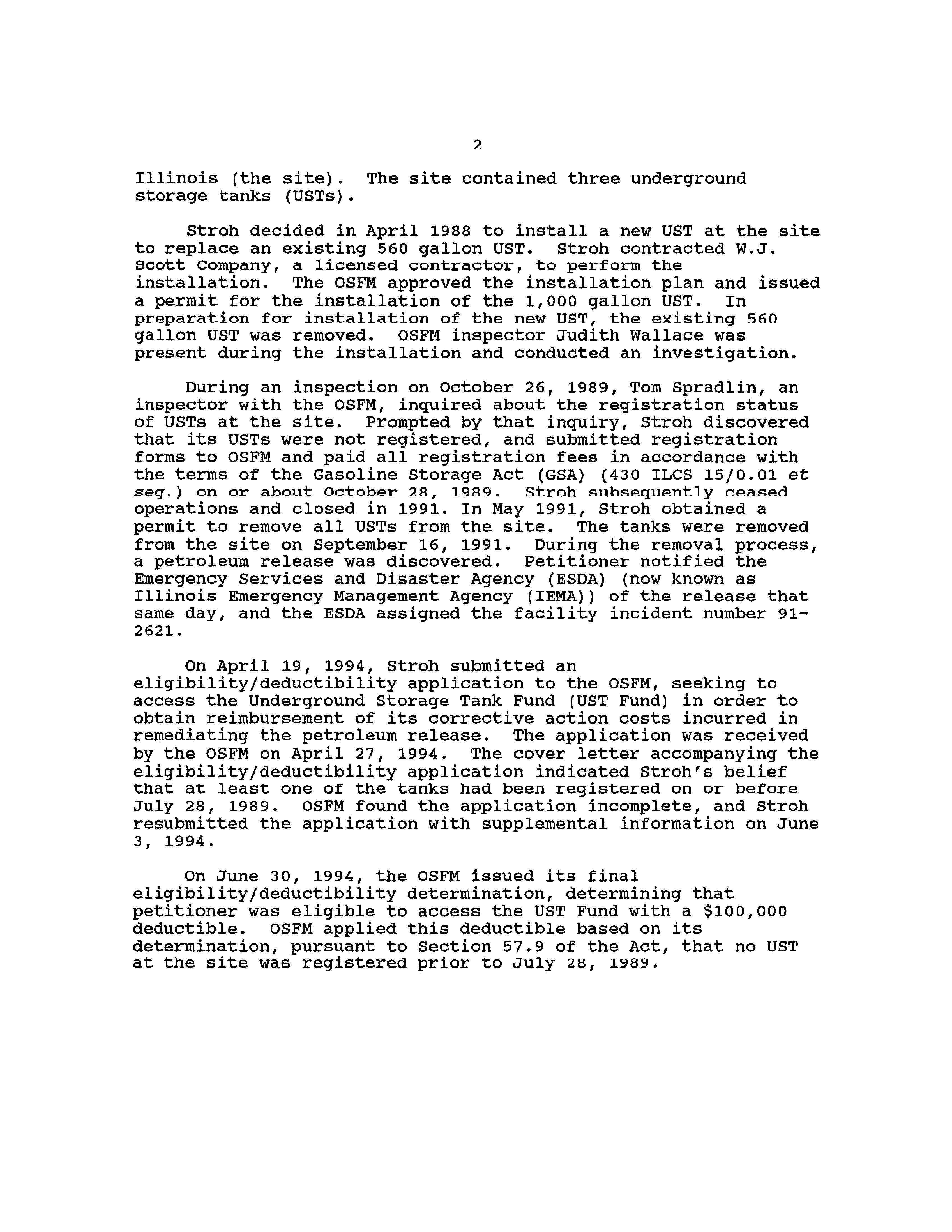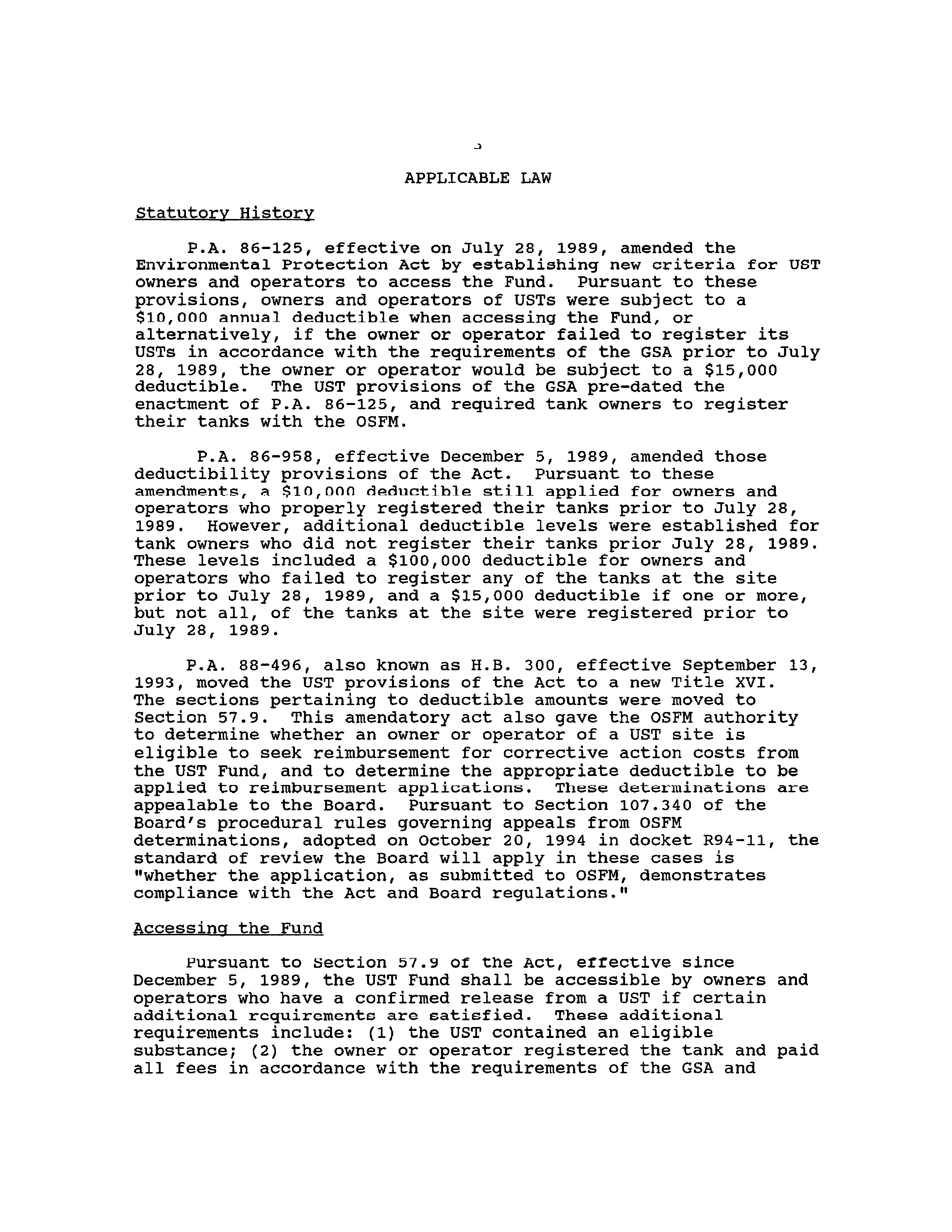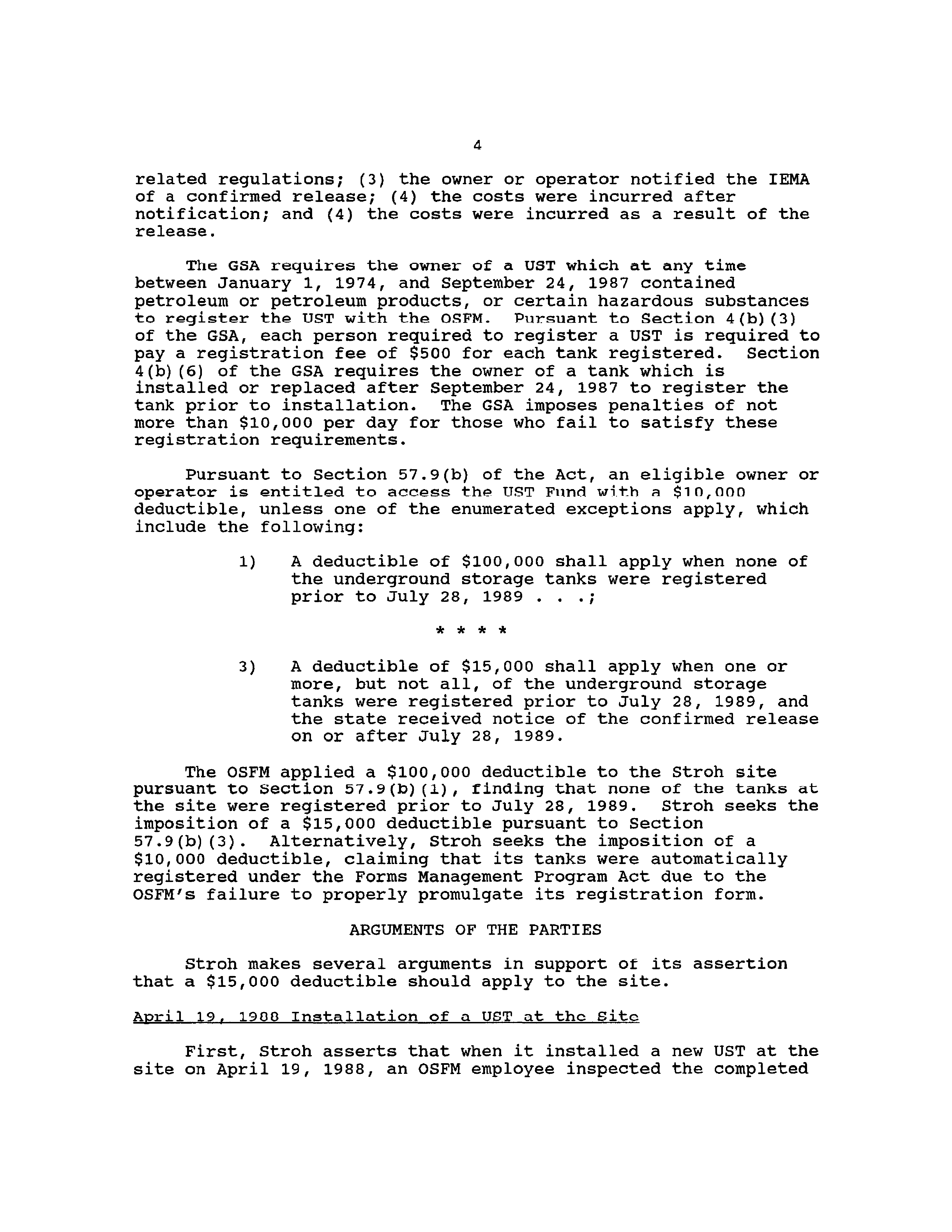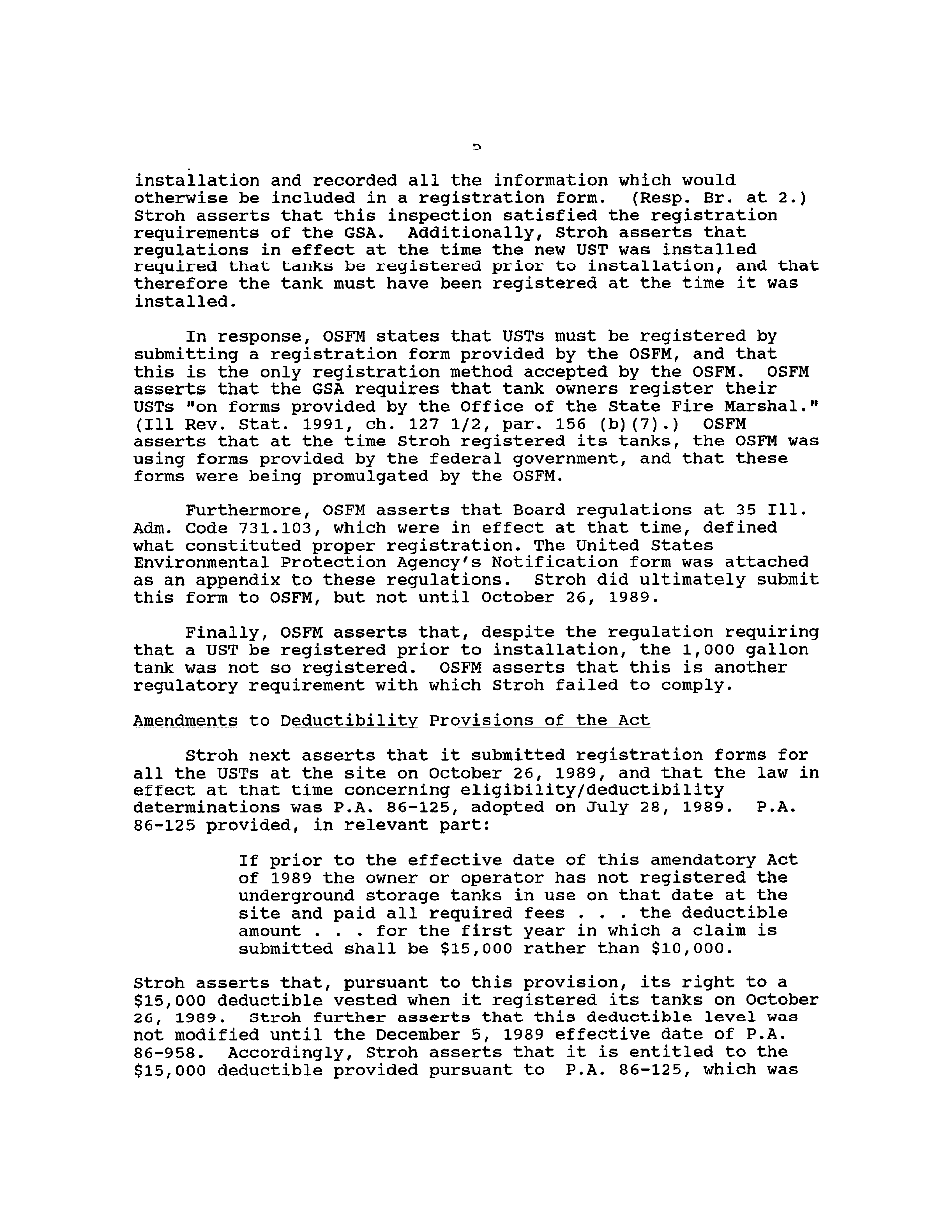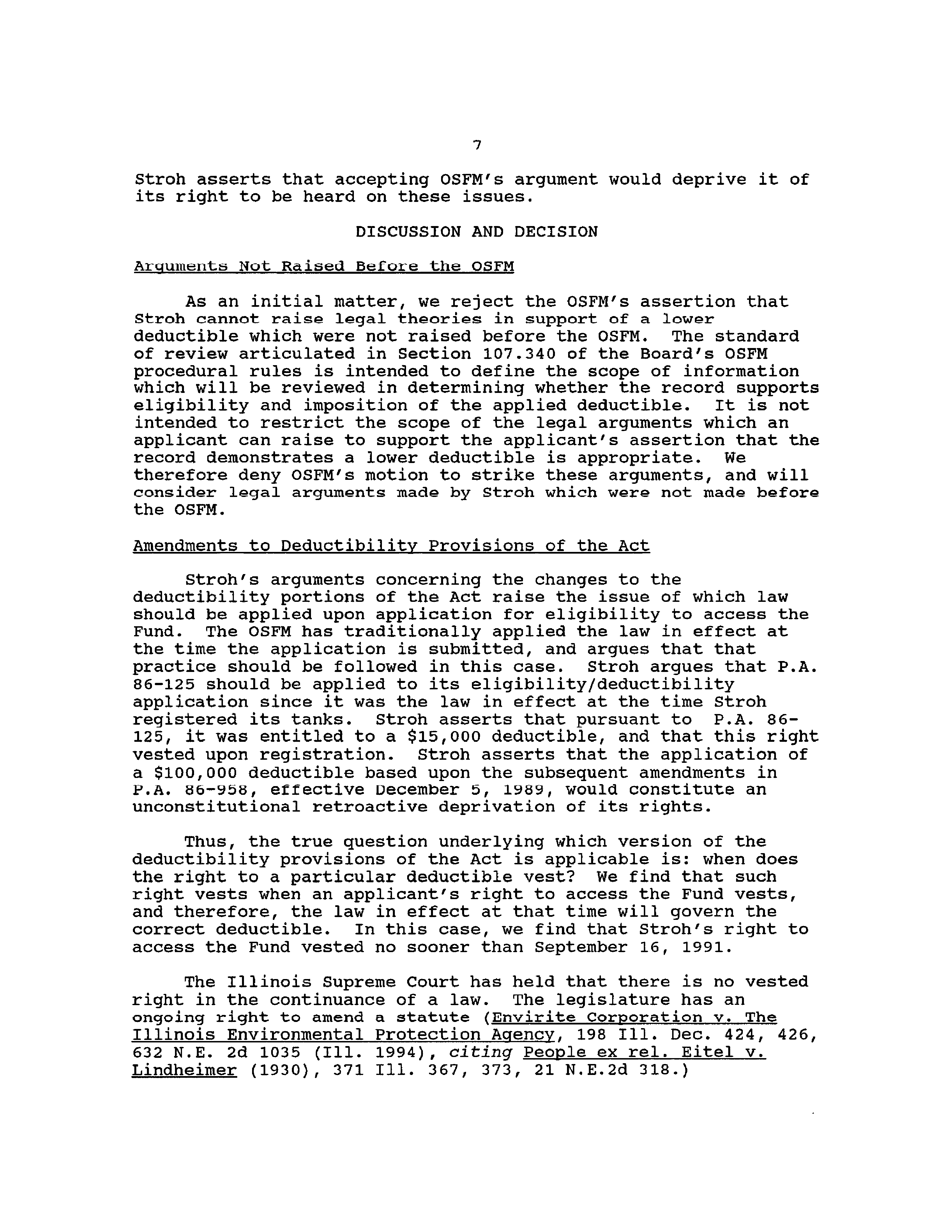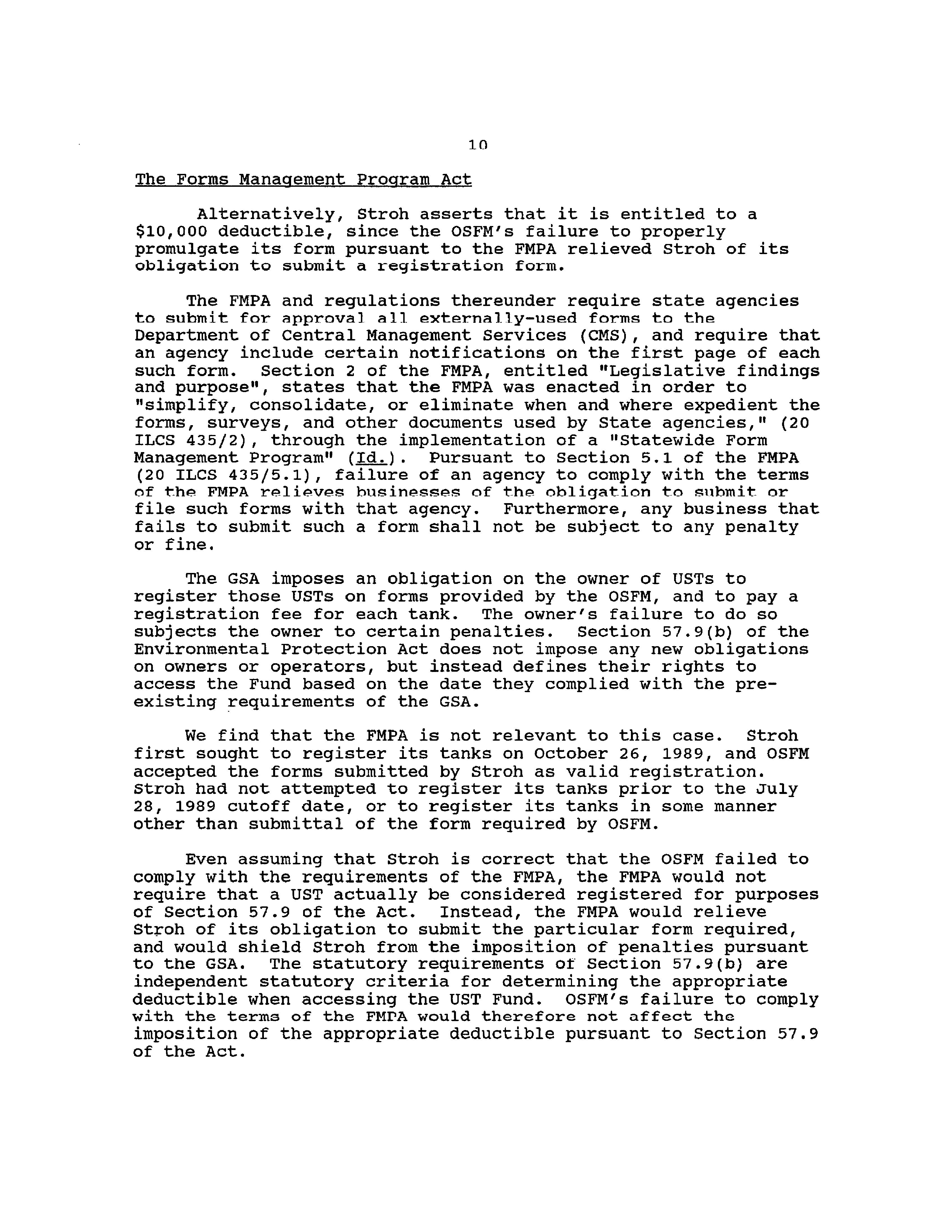TLtITNOTS POT.TJTPTON CONTROL BOARD
July 20,
1995
STROH OIL COMPANY,
)
Petitioner,
)
v.
)
PCB 94—215
)
(UST Fund)
OFFICE OF THE STATE
)
FIRE MARSHAL,
)
Respondent.
STEPHEN F. HEDINGER AND BECKY
S. MCCRAY,
MOHAN, ALEWELT,
PRILLAMAN & ADAMI, APPEARED ON BEHALF OF PETITIONER;
JOHN KNITTLE, ASSISTANT ATTORNEY GENERAL, APPEARED ON BEHALF OF
RESPONDENT.
OPINION AND ORDER OF THE BOARD
(by M. MoFawn):
This matter
is before the Board on an August 8,
1994
petition for review filed by Stroh Oil Cotpany
(Stroh), seeking
review of a June
30,
1994 final eligibility/deductibility
determination issued by the Office of the State Fire Marshal
(OSFM).
Stroh seeks the reversal of OSFM’s imposition of a
$100,000 deductible, and seeks to have a $10,000 deductible, or
alternatively,
a $15,000 deductible, applied to the site.
On
December 21,
1994, Stroh filed an amended petition which added
additional arguments concerning the Forms Management Program Act
(FMPA), and the installation of
a UST at the site on April 19,
1988.
The Board accepted the amended petition by order dated
January 11,
1995, and directed the parties to address the FMPA at
hearing and in post-hearing briefs.
On February 11,
1995,
respondent filed a motion to strike the arguments raised in
petitioner’s amended petition concerning the FMPA.
A hearing was held in this matter on March
3,
1995,
in
Springfield,
Illinois before hearing officer Deborah L.
Frank.
At hearing, respondent made a motion to strike which respondent,
at the direction of the hearing officer, renewed in a post—
hearing motion filed on March
14,
1995.
on April
4,
1995
petitioner filed its post-hearing brief, and a response to
petitioner’s post-hearing motion, accompanied by a motion to
respond instanter.
Respondent OSFM filed its post-hearing brief
on April
18,
1995, and petitioner filed its reply brief on April
24,
1995.
BACKGROUND
Stroh Oil Company was a petroleum jobber from 1936 until
1990.
Stroh also acted as a petroleum retailer and operated a
bulk storage plant at its facility in Oakford, Menard County,
2
Illinois
(the site).
The site contained three underground
storage tanks
(USTs).
Stroh decided in April 1988 to install a new UST at the site
to replace an existing 560 gallon UST.
Stroh contracted W.J.
Scott Company,
a licensed contractor, to perform the
installation.
The OSFM approved the installation plan and issued
a permit for the installation of the 1,000 gallon UST.
In
preparation for installation
of
the new LIST,
the existing 560
gallon LIST was removed.
OSFM inspector Judith Wallace was
present during the installation and conducted an investigation.
During an inspection on October 26,
1989, Tom Spradlin, an
inspector with the OSFM, inquired about the registration status
of UST5 at the site.
Prompted by that inquiry, Stroh discovered
that its USTs were not registered, and submitted registration
fonts to OSFM and paid all registration fees in accordance with
the terms of the Gasoline Storage Act
(GSA)
(430 ILCS 15/0.01 et
seq.)
on or about October
28,
1989.
Stroh
subsequently
ceased
operations and closed in 1991.
In May 1991,
Stroh obtained a
permit to remove all USTs from the site.
The tanks were removed
from the site on September 16,
1991.
During the removal process,
a petroleum release was discovered.
Petitioner notified the
Emergency Services and Disaster Agency (ESDA)
(now known as
Illinois Emergency Management Agency
(IEMA))
of the release that
same day, and the ESDA assigned the facility incident number 91-
2621.
On April 19,
1994,
Stroh submitted an
eligibility/deductibility application to the OSFM, seeking to
access the Underground Storage Tank Fund
(UST Fund)
in order to
obtain reimbursement of its corrective action costs incurred in
remediating the petroleum release.
The application was received
by the OSFM on April
27,
1994.
The cover letter accompanying the
eligibility/deductibility application indicated Stroh’s belief
that at least one
or the tanks had been registered on or before
July 28,
1989.
OSFM found the application incomplete, and Stroh
resubmitted the application with supplemental information on June
3,
1994.
On June 30,
1994, the OSFN issued its final
eligibility/deductibility determination, determining that
petitioner was eligible to access the UST Fund with a $100,000
deductible.
OSFM applied this deductible based on its
determination,
pursuant to Section
57.9 of the Act, that no UST
at the site was registered prior to ~Ju1y28,
1989.
a
APPLICABLE LAW
Statutory History
P.A.
86-125, effective on July 28,
1989,
amended the
Environmental Protection Act by establishing new criteria for UST
owners and operators to access the Fund.
Pursuant to these
provisions, owners and operators of UST5 were subject to a
$10,000 annual deductible when accessing the Fund,
or
alternatively,
if the owner or operator failed to register its
LISTs in accordance with the requirements of the GSA prior to July
28,
1989,
the owner or operator would be subject to
a $15,000
deductible.
The UST provisions of the GSA pre-dated the
enactment of P.A.
86—125, and required tank owners to register
their tanks with the OSFM.
P.A.
86-958, effective December 5,
1989,
amended those
deductibility provisions
of the Act.
Pursuant to these
amendments, a $10,000 deductible still applied for owners and
operators who properly registered their tanks prior to July 28,
1989.
However, additional deductible levels were established for
tank owners who did not register their tanks prior July 28,
1989.
These levels included a $100,000 deductible for owners and
operators who failed to register any of the tanks at the site
prior to July 28,
1989, and a $15,000 deductible
if one or more,
but not all,
of the tanks at the site were registered prior to
July 28,
1989.
P.A.
88-496, also known as H.B.
300, effective September
13,
1993,
moved the UST provisions of the Act to a new Title XVI.
The sections pertaining to deductible amounts were moved to
Section 57.9.
This amendatory act also gave the OSFM authority
to determine whether an owner or operator of a UST site is
eligible to seek reimbursement for corrective action costs from
the UST Fund, and to determine the appropriate deductible to be
applied to reimbursement applications.
These determinations
are
appealable to the Board.
Pursuant to Section 107.340 of the
Board’s procedural rules governing appeals from OSFM
determinations,
adopted on October 20,
1994 in docket R94-11, the
standard of review the Board will apply in these cases is
“whether the application,
as submitted to OSFM, demonstrates
compliance with the Act and Board regulations.”
Accessing the Fund
pursuant to section 57.9 of the Act,
errective since
December 5,
1989, the UST Fund shall be accessible by owners and
operators who have a confirmed release from a UST if certain
additional requirements are satisfied.
These additional
requirements include:
(1) the UST contained an eligible
substance;
(2) the owner or operator registered the tank and paid
all fees in accordance with the requirements of the GSA and
4
related regulations;
(3) the owner or operator notified the
IEMA
of a confirmed release;
(4) the costs were incurred after
notification; and
(4) the costs were incurred as a result of the
release.
The GSA requires the owner of
a UST which at any time
between January
1,
1974,
and September 24,
1987 contained
petroleum or petroleum products,
or certain hazardous substances
to register the
TJST
with the
OSPM.
Pursuant
to
~.ection
4(b)(3)
of the GSA, each person required to register a UST is required to
pay a registration fee of $500 for each tank registered.
Section
4(b) (6)
of the GSA requires the owner of a tank which is
installed or replaced after September
24,
1987 to register the
tank
prior
to
installation.
The
GSA
imposes
penalties
of
not
more than $10,000 per day for those who fail to satisfy these
registration
requirements.
Pursuant to Section 57.9(b)
of the Act,
an eligible owner or
operator is entitled
to
access
the
UST
Fund
with
~
$10,000
deductible, unless one of the enumerated exceptions apply, which
include
the
following:
1)
A deductible of $100,000 shall apply when none of
the
underground
storage tanks were registered
prior to July 28, 1989
.
.
.;
3)
A deductible of $15,000 shall apply when one or
more, but not all,
of the underground storage
tanks were registered prior to July 28,
1989, and
the state received notice of the confirmed release
on or after July 28,
1989.
The OSFM applied a $100,000 deductible to the Stroh site
pursuant to Section 57
•
9(b) (1), finding that none
of the tanks at
the site were registered prior to July 28,
1989.
Stroh seeks the
imposition of a $15,000 deductible pursuant to Section
57.9(b) (3).
Alternatively,
Stroh seeks the imposition of
a
$10,000 deductible, claiming that its tanks were automatically
registered under the Forms Management Program Act due to the
OSFM’s failure to properly promulgate its registration form.
ARGUMENTS OF THE PARTIES
Stroh makes several arguments in support or its assertion
that a $15,000 deductible should apply to the site.
April
19,
1988
Installation
of
a
UST
at the Sitc
First,
Stroh
asserts
that
when
it
installed
a
new
UST
at
the
site on April
19,
1988,
an OSFM employee inspected the completed
installation and recorded all the information which would
otherwise be included in a registration form.
(Resp.
Br.
at 2.)
Stroh asserts that this inspection satisfied the registration
requirements of the GSA.
Additionally, Stroh asserts that
regulations in effect at the time the new UST was installed
required that tanks be registered prior to installation,
and that
therefore the tank must have been registered at the time it was
installed.
In response, OSFM states that UST5 must be registered by
submitting a registration fon provided by the OSFM, and that
this is the only registration method accepted by the OSFM.
OSFM
asserts that the GSA requires that tank owners register their
UST5 “on forms provided by the Office of the State Fire Marshal.”
(Ill Rev.
Stat.
1991,
ch.
127 1/2,
par.
156
(b)(7).)
OSFM
asserts that at the time Stroh registered its tanks, the OSFM was
using forms provided by the federal government, and that these
forms were being promulgated by the OSFM.
Furthermore, OSFM asserts that Board regulations at 35 Ill.
Adm. Code 731.103, which were in effect at that time, defined
what constituted proper registration. The United States
Environmental Protection Agency’s Notification form was attached
as an appendix to these regulations.
Stroh did ultimately submit
this form to OSFM, but not until October 26,
1989.
Finally, OSFM asserts that,
despite the regulation requiring
that a UST be registered prior to installation, the 1,000 gallon
tank was not so registered.
OSFM asserts that this is another
regulatory requirement with which Stroh failed to comply.
Amendments
to Deductibility Provisions of the Act
Stroh next asserts that it submitted registration forms for
all the USTs at the site on October 26,
1989,
and that the law in
effect at that time concerning eligibility/deductibility
determinations was P.A.
86—125,
adopted on July 28,
1989.
P.A.
86-125 provided,
in relevant part:
If prior to the effective date of this amendatory Act
of 1989 the owner or operator has not registered the
underground storage tanks in use on that date at the
site and paid all required fees
•
.
.
the deductible
amount
.
.
.
for the first year in which a claim is
submitted shall be $15,000 rather than $10,000.
Stroh asserts that, pursuant to this provision,
its right to a
$15,000 deductible vested when it registered its tanks on October
26,
1989.
Stroh further asserts that this deductible level was
not modified until the December 5,
1989 effective date of P.A.
86-958.
Accordingly, Stroh asserts that it is entitled to the
$15,000 deductible provided pursuant to
P.A.
86—125, which was
b
in effect at the time its tanks were registered.
Stroh asserts
that any contrary decision would deprive Stroh of its property
without due process and would violate Stroh’s right to equal
protection of the laws.
In response, OSFM asserts that Stroh is raising this
argument for the first time in its post-hearing brief, and that
OSFM had no opportunity to present testimony or question
witnesses concerning this argument.
OSFM therefore asserts that
the Board should not allow this argument to be heard. Addressing
the merits of the arguments,
OSFM asserts that the date the
deductibility application is received determines the law to be
used in making the deductibility decision.
OSFM asserts that a
deductibility determination cannot be made until an application
is received, since the deductible is based on information
contained in the application.
OSFM therefore asserts that Stroh
could not have a right to any deductible until its application
was received by OSFM.
The Forms Mana~einentProgram Act
Finally, Stroh asserts that OSFM’s failure to comply with
the Forms Management Program Act
(FMPA)
in promulgating its
registration form relieved Stroh of its obligation to submit the
form,
and made registration with the GSA unnecessary.
Stroh
therefore asserts that it is entitled to a $10,000 deductible.
The OSFN raises several arguments in response to Stroh’s
assertions concerning the FMPA.
First, OSFM asserts its position
that the Board should refuse to hear this argument since it was
not raised before OSFM.
Second, the OSFN asserts that the Act
does not give the Board authority to decide issues involving the
FMPA.
Third, OSFM asserts that the Board is not the proper
agency to enforce the FMPA,
since the rules implementing the FMPA
state that it is the responsibility of Central Management
Services
(CMS)
to enforce the
FI’IPA.
Finally, QSFN asserts that
even if the FMPA does apply,
its form complied with the terms of
the FMPA.
Arguments. Not. Raised Before the OSFM
The OSFN asserts that Stroh raises several arguments before
the Board which were not raised before the OSFM.
The OSFM
asserts that these arguments should not be heard by the Board
since the standard of review in the Board’s procedural rules for
eligibility/deductibility determination appeals is limited to
consideration of “whether the application,
as submitted to OSFM,
demonstrates compliance with the Act and Board regulations.”
In response, Stroh asserts that there was no hearing before
the OSFM, and that Stroh had no opportunity to identify the
reason for the OSFM’s decision or to challenge that decision.
7
Stroh asserts that accepting OSFM’s argument would deprive it of
its right to be heard on these issues.
DISCUSSION AND DECISION
Arguments Not Raised Before the OSFM
As an initial matter, we reject the OSFM’s assertion that
Stroh cannot
raise
legal
theories in support
of
a lower
deductible which were not raised before the OSFM.
The standard
of review articulated in Section 107.340 of the Board’s OSFM
procedural rules is intended to define the scope of information
which will be reviewed in determining whether the record supports
eligibility and imposition of the applied deductible.
It
is not
intended to restrict the scope of the legal arguments which an
applicant can raise to support the applicant’s assertion that the
record demonstrates
a lower deductible
is appropriate.
We
therefore deny OSFM’s motion to strike these arguments, and will
consider
legal arguments made by Stroh which were not made before
the OSFM.
Amendments to Deductibility Provisions
of the Act
Stroh’s arguments concerning the changes to the
deductibility portions of the Act raise the issue of which law
should be applied upon application for eligibility to access the
Fund.
The
OSFM
has traditionally applied the law in effect at
the time the application
is submitted,
and argues that that
practice should be followed in this case.
Stroh argues that P.A.
86-125 should be applied to its eligibility/deductibility
application since it was the law in effect at the time Stroh
registered its tanks.
Stroh asserts that pursuant to
P.A.
86-
125,
it
was entitled to a $15,000 deductible, and that this right
vested upon registration.
Stroh asserts that the application of
a $100,000 deductible based upon the subsequent amendments
in
P.A.
86—955,
effective December
5,
1989, would constitute an
unconstitutional retroactive deprivation of its rights.
Thus, the true question underlying which version of the
deductibility provisions of the Act is applicable
is: when does
the right to a particular deductible vest?
We find that such
right vests when an applicant’s right to access the Fund vests,
and therefore,
the law in effect at that time will govern the
correct deductible.
In this case, we find that Stroh’s right to
access the Fund vested no sooner than September 16,
1991.
The Illinois Supreme Court has held that there is no vested
right in the continuance of a law.
The legislature has an
ongoing right to amend a statute
(Envirite corporation v. The
Illinois Environmental Protection Agency,
198 Ill. Dec.
424,
426,
632 N.E.
2d 1035
(Ill. 1994),
citing
People ex rel.
Eitel v.
Lindheimer
(1930),
371 Ill.
367,
373,
21 N.E.2d 318.)
S
Furthermore, the Appellate Court
has
addressed the issues of
vesting of rights and retroactive deprivation of rights in
ChemRex.
Inc.
v. Pollution Control Board,
195 Ill. Dec.
499,
628
N.E.
2d 963
(1st Dist.
1993.)
In that case,
the Illinois
Environmental Protection Agency
(Agency) denied eligibility for
ChemRex to access the UST Fund based on a change in the
eligibility criteria that occurred after a release from ChemRex’s
tanks had occurred, but before ChemRex applied for reimbursement.
The Board upheld the Agency’s denial of eligibility,
on the
grounds that the law in effect at the time the reimbursement
application was submitted controlled the eligibility
determination.
The appellate court reversed, finding that the
application of the law to ChemRex constituted a retrospective
law.
The court,
citing the Illinois Supreme Court opinion in
United States Steel Credit Union v. Knight 32 Ill.2d 138,
142,
204 N.E.2d 4,
6
(1965),
stated:
The Illinois Supreme Court has defined a retrospective
law as
‘one that takes away or impairs vested rights
acquired under existing laws,
or creates a new
obligation,
or imposes a new duty, or attaches a new
disability
in respect of transactions or considerations
already past.’
(Citation omitted.)
Applying this test in ChemRex, the Appellate Court found
that applying the amendment to ChemRex so as to deprive ChemRex
of the right to access the Fund constituted a retrospective
application of the law,
in that it attached “a new disability in
respect of transactions or considerations already past.”
The
court emphasized that ChemRex had discovered, reported, and set
about repairing the releases immediately after the leaks
occurred, prior to the date of the statutory amendment.
The
court found that nothing in the record revealed an omission or
want or diligence on the part or ChemRex.
Under these
circumstances, the court found that ChemRex had a reasonable
expectation of reimbursement from the Fund,
and that eligibility
for Fund reimbursement should have been determined at the time
the tank owner or operator reported the release and embarked upon
remediation.
Applying this test to Stroh, we find that application of the
law in effect at the time of Stroh’s eligibility/deductibility
application does not constitute retrospective application of a
law.
The law has not changed since Stroh reported its release
and began its remedial efforts.
Stroh had
rio
reasonable
expectation of accessing the Fund with a $15,000 deductible,
since the law imposing a
$100,000 deductible
was in
effoct
for
over eight months prior to the time when Stroh reported a
release.
Furthermore,
Stroh did not have a right to access the
Fund until the release was reported on September 16,
1991, and it
9
could therefore claim no vested interest in or reasonable
expectation of the application of a particular deductible
effective prior to that date.
Stroh’s registration of its tanks
was not a voluntary action undertaken in anticipation of
obtaining a particular deductible;
Stroh was required to
register its tanks by July of 1989 in order to comply with the
GSA, and in order to comply with the requirements of federal law.
The Board finds that the effect of PA.
86-958 was
prospective only, and that it did not take away any of Stroh’s
vested rights or impose any disability upon Stroh in respect to
transactions already past.
We therefore find that the OSFM
applied the correct law to petitioners.
Having determined which
law should apply to petitioner, we next examine what deductible
should apply to petitioners under that law.
April
19.
1988 Installation of
a UST at the Site
The
OS~M
determined that petitioner
was eligible to access
the UST Fund with a $100,000 deductible pursuant to Section 57.9
of the Act,
finding that no UST at the site was registered prior
to July 28,
1989.
Stroh argues that a $15,000 deductible should
apply to its site,
since a 1000 gallon tank,
installed at the
site in April 1988, should have been considered registered at the
time it was installed.
Stroh asserts that the tank should be
considered registered since an OSFM inspector was on—site during
the installation, and the inspector’s report was included within
the OSFM’s files.
Stroh argues that the inclusion of the
inspection report in the OSFM’s files should constitute
registration within the meaning of the GSA, since the inspection
report contains all the information which would have been
contained in a registration form.
We disagree.
Stroh cannot rely on an inspection report filed by an OSFM
inspector to satisfy its obligation to register its tanks.
A
tank owner has a statutory obligation to register its tanks,
which is independent of the owner’s obligation to notify the OSFM
of a tank installation.
It is tank registration which
is
relevant for determining the appropriate deductible applicable to
a UST site.
Additionally, we agree with OSFM that it is not
OSFM’s responsibility to cull the information necessary for
registration from an installation inspection report.
Furthermore, we disagree with Stroh’s assertion that its
tank must be considered registered at the time of installation
since, pursuant to Section 4 (b)
()
or the GSA,
an owner
or a
UST
which is installed or replaced after September 24, 1987 must
register the tank prior to installation.
It was Stroh’s
otatutory obligation to regicter the tank prior to inetallation,
and failure to do so is Stroh’s failure to satisfy its statutory
obligations.
10
The Forms Management Program Act
Alternatively, Stroh asserts that it is entitled to
a
$10,000 deductible,
since the OSFM’s failure
to properly
promulgate its form pursuant to the FMPA relieved Stroh of its
obligation to submit a registration
form.
The FMPA and regulations thereunder require state agencies
to submit for approval
all,
externally—used forms
to the
Department of Central Management Services
(CMS), and require that
an agency include certain notifications on the first page of each
such form.
Section
2 of the FMPA, entitled “Legislative findings
and purpose”, states that the FMPA was enacted in order to
“simplify, consolidate,
or eliminate when and where expedient the
forms, surveys,
and other documents used by State agencies,”
(20
ILCS 435/2), through the implementation of a “Statewide Form
Management Program”
(I~J.
Pursuant to Section 5.1 of the FMPA
(20 ILCS 435/5.1), failure of an agency to comply with the terms
of the FMPA relieves businesses of the obligation to submit or
file such forms with that agency.
Furthermore, any business that
fails to submit such a form shall not be subject to any penalty
or fine.
The GSA imposes an obligation on the owner of UST5 to
register those USTs on forms provided by the OSFM,
and to pay a
registration fee for each tank.
The owner’s failure to do so
subjects the owner to certain penalties.
Section 57.9(b)
of the
Environmental Protection Act does not impose any new obligations
on owners or operators, but instead defines their rights to
access the Fund based on the date they complied with the pre-
existing requirements of the GSA.
We find that the FMPA is not relevant to this case.
Stroh
first sought to register its tanks on October 26,
1989,
and OSFM
accepted the forms submitted by Stroh as valid registration.
Stroh had not attempted to register its tanks prior to the July
28, 1989 cutoff date,
or to register its tanks in some manner
other than submittal of the form required by OSFM.
Even assuming that Stroh is correct that the OSFN failed to
comply with the requirements of the FMPA, the FMPA would not
require that
a UST actually be considered registered for purposes
of Section 57.9 of the Act.
Instead, the FMPA would relieve
Stnh of its obligation to submit the particular form required,
and would shield Stroh from the imposition of penalties pursuant
to the GSA.
The statutory requirements of Section 57.9(b) are
independent statutory criteria for determining the appropriate
deductible when accessing the UST Fund.
OSFM’s failure to comply
with the
terms of
the
FMPA would therefore not affect the
imposition of the appropriate deductible pursuant to Section 57.9
of the Act.
Si.
The Board hereby finds that, pursuant to Section 57.9 of the
Act, October 26, 1989 is the appropriate registration date for
Stroh’s UST5.
Having reviewed the legislative findings and
purpose set forth at Section
2 of the FMPA, we do not believe
that the legislature intended to require otherwise.
CONCLUSION
The Board finds that
OSFM correctly applied
a $100,000
deductible to Stroh’s site.
The decision of the OSFM is
therefore affirmed.
This opinion constitutes the Board’s conclusions of law and
findings of fact in this matter.
ORDER
The June 30, 1994 decision of the Office of the State Fire
Marshal, finding Stroh Oil company eligible to access the
Underground Storage Tank Fund with a $100,000 deductible for
remediation associated with the September 16, 1991 release of
petroleum at Stroh’s facility in Oakford, Menard County, Illinois
is hereby affirmed.
IT IS SO ORDERED.
Section 41 of the Environmental Protection Act
(415 ILCS 5/41
(1992)) provides for the appeal of final Board orders within 35
days of the date of service of this order.
The Rules of the
Supreme Court of Illinois establish filing requirements.
(See
also 35 Ill. Adm.
Code 101.246.
“Motions for Reconsideration”.)
I, Dorothy M.
Gunn,
Clerk of the Illinois Pollution Control
Board, hereby certify that the aboy-e opinion and order was
adopte2, on the
CL~2O~?t
day of
_______________
1995,
by a vote
of
——0.
6’
~
1~•
~
Dorothy M. Aünn,
Clerk
Illinois P~)lutionControl Board


